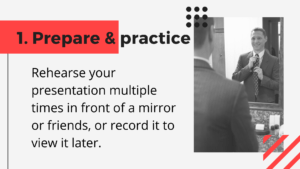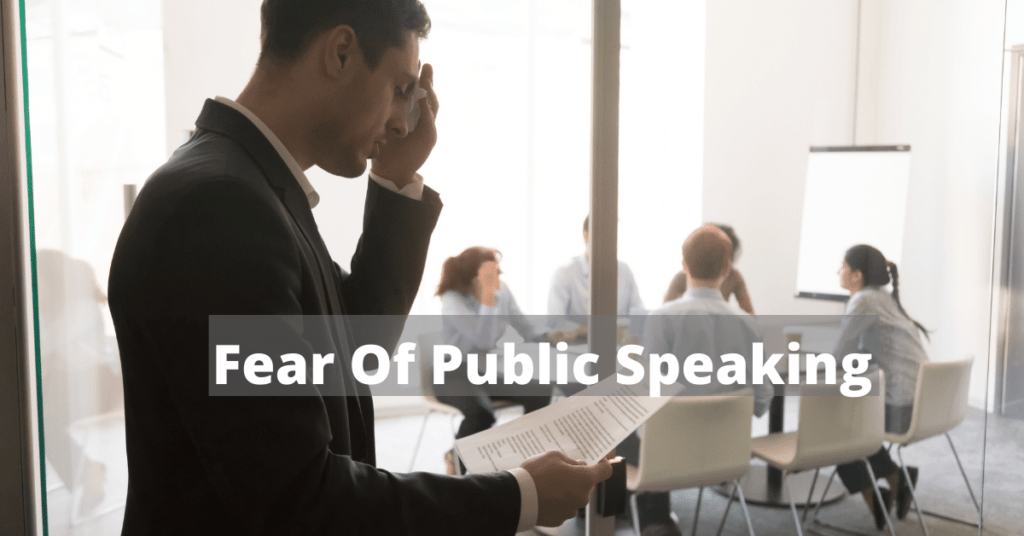Many people have a fear of public speaking. In most cases, this fear can be attributed to a bad experience in which they were not prepared and had the spotlight put on them. This is why it’s important to take some time to prepare yourself with a script, a list of points you want to cover, and a backup plan in case things don’t go according to plan when you’re in front of an audience.
Contents
What Is Public Speaking?

Public speaking is a form of communication that takes place in front of a live audience where the speaker is unable to directly interact with the audience. It is commonly used, for example, during speeches at events, presentations to inform or influence an audience, in classrooms to share knowledge with students, and as part of social activities.
Public speaking is one of the most common fears in people. Many people are afraid to speak in front of an audience, especially if they have no experience or preparation for this type of situation. This fear can be attributed to a bad experience in which they were not prepared and had the spotlight put on them. It’s important to take some time before you present your idea in public so that you are fully prepared with a script, a list of points you want to cover, and a backup plan should things go wrong when presenting your idea. The following article will explore these three topics more deeply so that readers can become better equipped for their own presentations.
The Fear Of Public Speaking (Glossophobia)
 According to results from the National Commission of Health, twenty-seven percent (27%) of adults reported anxiety about public speaking. The fear of public speaking is the third most common phobia among adults, after the fear of death and fear of spiders.
According to results from the National Commission of Health, twenty-seven percent (27%) of adults reported anxiety about public speaking. The fear of public speaking is the third most common phobia among adults, after the fear of death and fear of spiders.
The fear of public speaking is a natural and common fear that can be traced back to our ancestors. For many years, public speaking was used as a way to deliver news or share important information with others in the community. In this type of scenario, the individual’s life was potentially on the line if they were not able to communicate effectively with the masses. They needed to ensure that they had their audience’s attention immediately, so the fear of being unable to do so was real for them.
Today, our society has many people who are afraid of public speaking. But the consequences are not as great as they may have been in the past. While we might experience a little anxiety before giving a presentation, it’s not something that’s going to cause our life to be in danger. With the advancement of technology, there are now other ways for us to get information out besides speaking in front of an audience.
Signs You Have Fear Of Public Speaking
If you’re not sure if you have a fear of public speaking, here are some signs that may indicate that you do:

- Experience a lot of anxiety before giving a presentation
- Get nervous when you think about having to speak in front of others
- Avoid opportunities to speak in public
- Feel like you can’t control what’s happening when you’re speaking in public
- Your heart races and you feel like you can’t breathe when you’re up in front of an audience
- You worry about making mistakes when speaking in public
- Feeling like everyone is watching and judging you
- You feel like you’re not smart or articulate enough to speak in public
If you experience any of these signs, it’s likely that you have a fear of public speaking. Don’t worry, though – there are things you can do to help overcome your fear.
Why Is Public Speaking Scary?
Public speaking is one of the most common fears among people because it can create a feeling of vulnerability. When we speak in front of others, they can see us, hear us, and judge us. This type of exposure can be very uncomfortable for some people and can lead to feelings of anxiety or fear.
In addition to the fear of being judged by others, public speaking can also be scary because it’s a new experience for many people. When we step up to the podium, we are in uncharted territory and we don’t know what to expect. This can lead to feelings of insecurity and doubt about our ability to present our ideas effectively.
Why Do People Have A Fear Of Public Speaking?
 There are several reasons that people may have a fear of public speaking including-
There are several reasons that people may have a fear of public speaking including-
- Lack of knowledge on the subject matter
- Nervousness
- Stage fright
- Fear of criticism
First, people who experience a fear of public speaking may not know enough about the subject matter to be able to communicate effectively. Second, some people become nervous and forget everything they wanted to say. Third, stage fright often causes people who are new speakers to lose their train of thought or fumble through words that sound incoherent. Fourth, many people blame their fear of public speaking on a fear of being judged or criticized by others.
How To Overcome The Fear Of Public Speaking?

It is important to manage conflicting emotions and feelings before and during a presentation. Prior to the presentation, creating and maintaining an atmosphere that supports communication will be beneficial by:
1) Being well-prepared on the subject matter; including knowing your point,
The fear of public speaking is the third most common phobia among adults, after the fear of death and fear of spiders.
2) Knowing your audience; which includes the ability to determine their thoughts and feelings based on the information collected prior to the presentation,
3) Developing visualization techniques; such as imagining yourself giving a successful presentation and calming self-talk statements like “I can do this” to build confidence.
4) Rehearsing the presentation; which can be accomplished by creating a detailed outline, researching any needed information, practicing using visual aids if applicable, and taking notes on speaking points for reminders.
5) Having an open mind about making mistakes or learning from them; so that you will be less likely to experience performance anxiety.
6) Practicing self-compassion; by being understanding, supportive, and forgiving of oneself when mistakes are made during the presentation.
7) Avoiding perfectionism; which will only increase feelings of anxiety and hinder performance.
8) Being aware of physical symptoms that may occur such as shaking, sweating, and feeling dizzy.
9) Relaxing before the presentation; such as taking a walk or listening to music.
10) Breathing deeply; which will help anxiety symptoms decrease and control nerves. It is suggested that people take three 3 deep breaths during the time it takes to say one sentence to improve performance.
11) Practicing visualization during the speech; by imagining yourself successfully completing your presentation and how you would like for it to go. It is important to only imagine the desired outcome, not what could potentially go wrong.
12) Remembering why you are doing this presentation; which will reduce feelings of anxiety and increase confidence if done correctly.
Preparing For Public Speaking
 There are several ways people can learn to overcome their fear of public speaking including practicing, becoming proficient on the subject matter, and understanding what makes them nervous and why they may be afraid to speak in front of an audience.
There are several ways people can learn to overcome their fear of public speaking including practicing, becoming proficient on the subject matter, and understanding what makes them nervous and why they may be afraid to speak in front of an audience.
- First, people should practice public speaking as often as possible. Practice will help speakers feel more comfortable when they are in front of an audience.
- Second, it is important to become proficient in the subject matter in order to feel confident when communicating.
- Third, people should understand what makes them nervous and why they may be afraid to speak in front of an audience.
There are several tips people can use to overcome their fear of public speaking including using deep breathing exercises, visualizing a successful presentation, and understanding that there is no such thing as a perfect speaker.
First, before giving a speech, deep breathing exercises may help take the focus off of things that make the speaker anxious and help them feel calmer in front of an audience. Second, visualizing a successful presentation can give speakers confidence when delivering their speech to an audience. Third, people should understand that there is no such thing as a perfect speaker. And they may not always be able to anticipate or control how others will react to their speech.
Practice Makes Perfect
The fear of public speaking is common among adults but anyone can experience it. However, with time and practice, the fear can be managed and even eliminated. The more one practices public speaking, the more confident one will become. There are many ways to overcome the fear of public speaking. By preparing well before the presentation, rehearsing, being aware of physical symptoms and how to manage them, practicing visualization, and maintaining self-compassion.
If public speaking is part of your job. It is important to remember that your fears are common, and being able to present successfully will increase confidence. It is also beneficial to have a colleague or friend present during presentations as a source of support and encouragement. Know what you will do if the anxiety symptoms become too great or things do not go as planned. You can have a trusted person in the audience talk with you. Provide a needed break from speaking during your presentation, or even take an unscheduled break to calm self-talk statements and anxiety symptoms.
Treatment Of Fear Of Public Speaking

Public speaking can be a daunting task for many adults. However, with time and practice, one can manage the fear and even eliminate it. The more one practices public speaking, the more confident one will become. There are many ways to overcome the fear of public speaking; by preparing well before the presentation, rehearsing, being aware of physical symptoms and how to manage them, practicing visualization, and maintaining self-compassion.
The treatment of fear of public speaking is possible in a number of ways.
Relaxation Techniques
One common way is to practice relaxation techniques before and during the presentation. You can choose techniques like taking a walk, listening to music, or doing deep breathing exercises. It is also helpful to visualize oneself giving a successful presentation. Other helpful techniques include preparing well for the presentation, rehearsing, being aware of physical symptoms and how to manage them, and practicing self-compassion.
Therapy
Another option is therapy. This may be helpful for those who have a severe fear of public speaking or for those who have other underlying issues that contribute to the fear. Therapy can help individuals learn how to cope with their fear and manage any anxiety symptoms that may occur.
Medication
There are also medications that can help manage the fear of public speaking. Medications such as beta-blockers can help reduce physical symptoms that often occur during presentations. However, it is important to speak with a doctor before taking any medication.
Self-help Books
There are also self-help books available that can help individuals learn how to cope with their fear of public speaking.
Avoiding alcohol and caffeinated beverages may also help reduce the severity of physical symptoms.
Conclusion
The fear of public speaking is a common phenomenon in business. The best way to combat this fear is by practicing how you will handle the situation when it arises. This article provides an extensive list of tips that can help ease your fears about public speaking. From how to prepare beforehand to what to say during presentations. As long as you prepare with these helpful strategies, giving a presentation should be easier than ever.
If you are looking for affordable Online Counseling MantraCare can help: Book a trial therapy session


